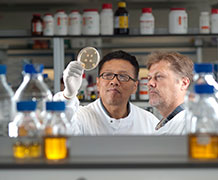Articles

Exeter received £29 million in research awards from the Research Councils in 2015-16.
University sees huge rise in research funding
The University of Exeter has more than doubled the amount of research funding it receives from Research Councils UK (RCUK), bucking the trend for falling government investment in research in the university sector.
Exeter received £29 million in research awards from the Research Councils in 2015-16, more than doubling the £13m in funding it received the previous year, according to analysis published in the Times Higher Education journal. The Times Higher have estimated success rates for Exeter at 38%, the highest reported for the Russell Group.
The University moved up the league table for the value of RCUK research awards from 23rd last year, to 15th place overall.
The sharp increase in awards to Exeter academics comes as the Russell Group of research-intensive universities experienced a 21 per cent dip in research funding.
Drs Astrid Wissenburg, Director of Research, said the increase reflects the high standard of research at Exeter. “This is really great recognition of the breadth of expertise at Exeter, including our interdisciplinary strengths, and tribute to the extremely high standard of research being conducted here,” she said.
According to the Times Higher, £1.1 billion was awarded by RCUK to UK universities in 2015/16, down from £1.3 billion in 2014/15. Most universities with high levels of grant income have seen a reduction in funding over the past year with some seeing funding tumble by more than 40%.
The sharp rise in research investment in Exeter reflects robust performance across the six main Research Councils, with particularly strong growth at the four Science, Technology, Engineering, Mathematics and Medicine ( STEM-M) funders.
- Exeter ranks first nationally for the number of awards from the Natural Environment Research Council (NERC) and is in the top ten of four Research Councils.
- It has also risen up the rankings for both the Engineering and Physical Sciences Research Council (EPSRC) and the Biotechnology and Biological Sciences Research Council (BBSRC) moving up 24 and 10 places, respectively.
- This year the University moved into the top 20 of Medical Research Council awards, by value, for the first time, following a sharp rise in medical research and ahead of the opening of the innovative Living Systems Institute next year.
The new Living Systems Institute (LSI) will pioneer novel approaches to understanding diseases and how they can be better diagnosed. This will inform more effective treatment strategies for some of the most severe diseases facing humanity, spanning a broad spectrum, from chronic neurodegenerative diseases to the animal and plant diseases that threaten food security.
Key awards underpinning this result for 2015/16 include the £2.6 million MRC Mastermind project 'ABPI Stratification and Extreme Response Mechanisms in Type 2 Diabetes', secured by Professor Andrew Hattersley and Exeter Medical School colleagues.
Exeter also received £1.9 million from the EPSRC for the new Centre for Mathematical Sciences in Healthcare, headed up by Professor John Terry and colleagues. It gained an £865k Arts and Humanities Research Council (AHRC) grant for Martin Levinson’s research into Disability and Community.
MRC Research Fellow Dr Jamie Walker was granted £845k from the Medical Research Council for a mechanistic investigation into the emergent function dynamics for the HPA axis. At BBSRC, Professor Nick Talbot (FRS) won £671k for his project 'Determining the mechanism of septin-mediated plant infection by the rice blast fungus Magnaporthe oryzae'.
Date: 13 October 2016
